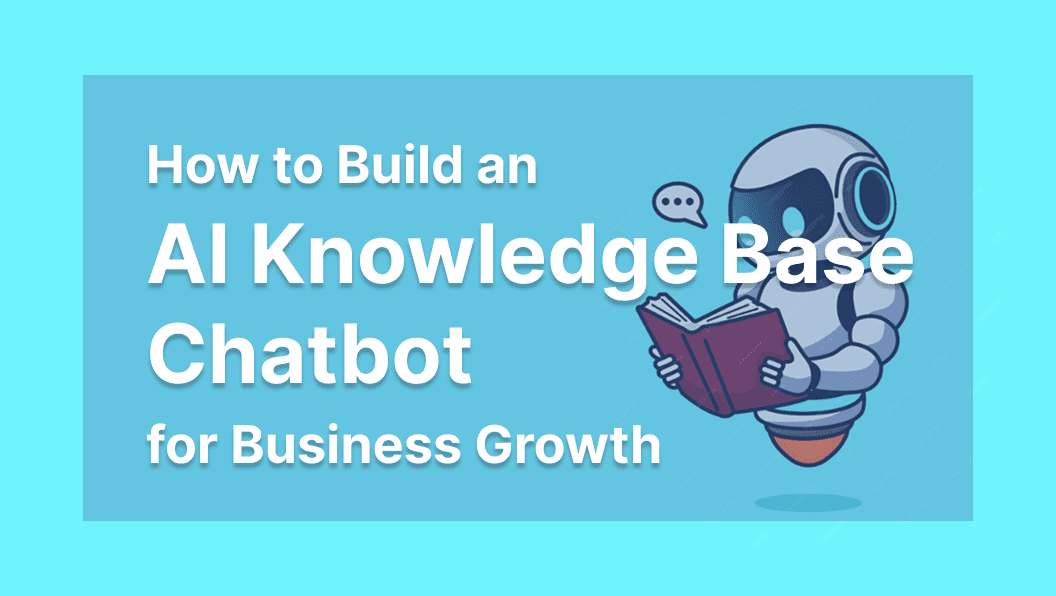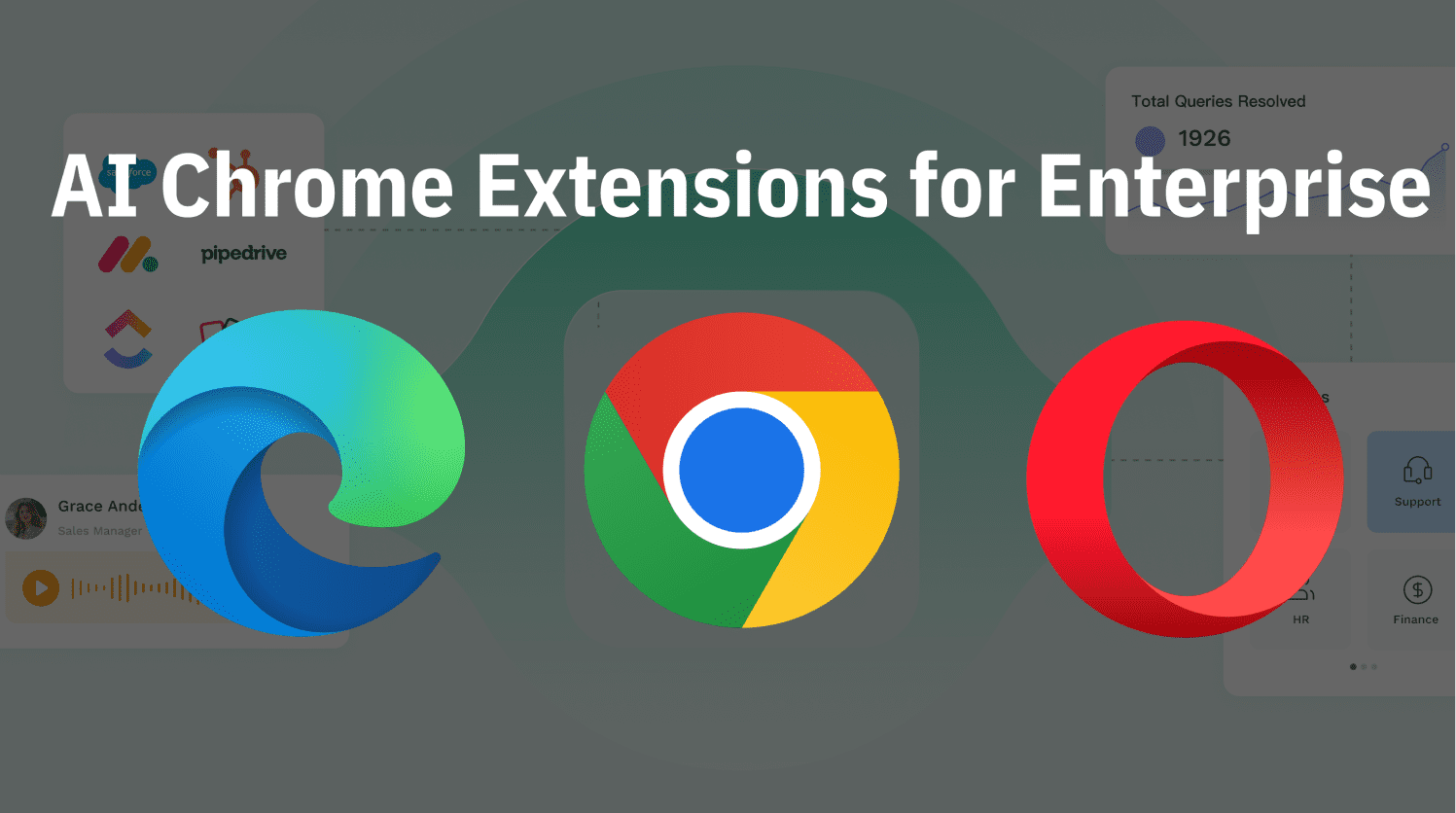"Why AI Agents Are Revolutionizing Real Estate"
The real estate industry is facing a seismic shift. 75% of top U.S. brokerages are now using AI. Real estate agents using AI are saving 10+ hours a week and reporting up to 35% higher conversion rates.
Manual customer service response is slow, with labor costs accounting for over 40%. The customer consultation conversion rate is less than 15% due to a gap in property/location/discount inquiries. Besides that, real estate agents showcase low efficiency in handling non-standard requirements, such as VR property tours, scheduling viewings, etc.
AI changes the equation by qualifying leads 24/7, building custom property recommendations, providing VR property tours, or scheduling showings with unmatched efficiency. In fact, AI could unlock $34 billion in efficiency gains for real estate by 2030, based on Morgan Stanley's analysis of 162 REIT and CRE firms with $92 billion in labor costs and over 525,000 employees.
Feel amazed? Stick around to learn how can real estate agents use AI to supercharge their business.
How Can Real Estate Agents Use AI? 5 Core Workflows
Automate Lead Nurturing, Client Service & Market Analysis
AI is reshaping every core workflow in real estate. Here's where it is driving the biggest changes:
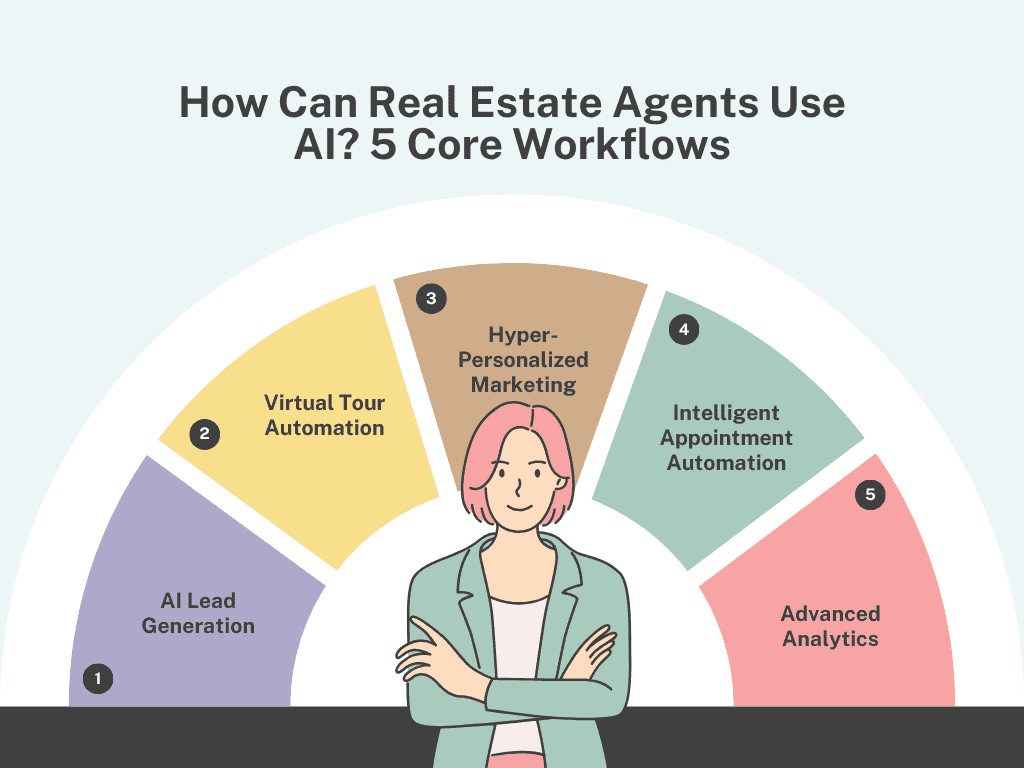
1. AI Lead Generation
Modern AI lead generation solutions, such as GPTBots' AI SDR, qualify leads 24/7 across various channels, including WhatsApp, web chat, and SMS. This approach leads to:
- Instant response and engagement with prospects, including answering questions, collecting data, asking qualification questions, etc.
- Smart routing of only high-intent leads to human agents.
- Automated syncing of data to CRM.
In fact, industry reports show that AI lead generation boosts lead volume by 300% and conversion rate by 30-40%.
2. Virtual Tour Automation
AI-driven conversations can embed interactive virtual tours to help clients visualize the property thoroughly. They receive instant access to 3D walkthroughs through Zillow 3D + GPTBots integration. The AI can also answer detailed questions about features, neighborhood amenities, etc.
3. Hyper-Personalized Marketing
AI for real estate agents lifts the game of property marketing. Real estate agents can use GPTBots' knowledge-trained AI to:
- Generate SEO listings
- Social ads with targeted campaigns for fine-tuned audiences
- Write and send personalized emails to clients
- Analyze inquiry data to make data-driven decisions
In short, AI-backed marketing operations free up human agents from repetitive marketing tasks and let them focus on building relationships and closing deals.
4. Intelligent Appointment Automation
AI agents can match client and agent calendars to book appointments. They also send SMS and email reminders to reduce no-shows. In addition, they can handle cancellations and follow-ups without human involvement.
5. Advanced Analytics
AI real estate tools can turn hours of research into real-time and actionable insights. It can offer information related to:
- Property value
- Area's crime records
- Market trends
- Natural disaster probability
- Local school stats
- Transportation and parking facilities
- Area's noise levels
AI solutions handle the heavy lifting of advanced property analysis and provide all the key insights to agents and investors to make smarter decisions. In addition, AI can instantly compare listings and flag under/overpriced properties for rapid adjustment.
Why AI Agents Outperform Generic AI Tools in Real Estate
When people hear "AI", many think of it as generic AI tools, like ChatGPT, Claude, etc. However, not all AI is created equal. Generic AI tools can automate basic responses, but it's the dedicated AI real estate agents that truly assist in improving performance:
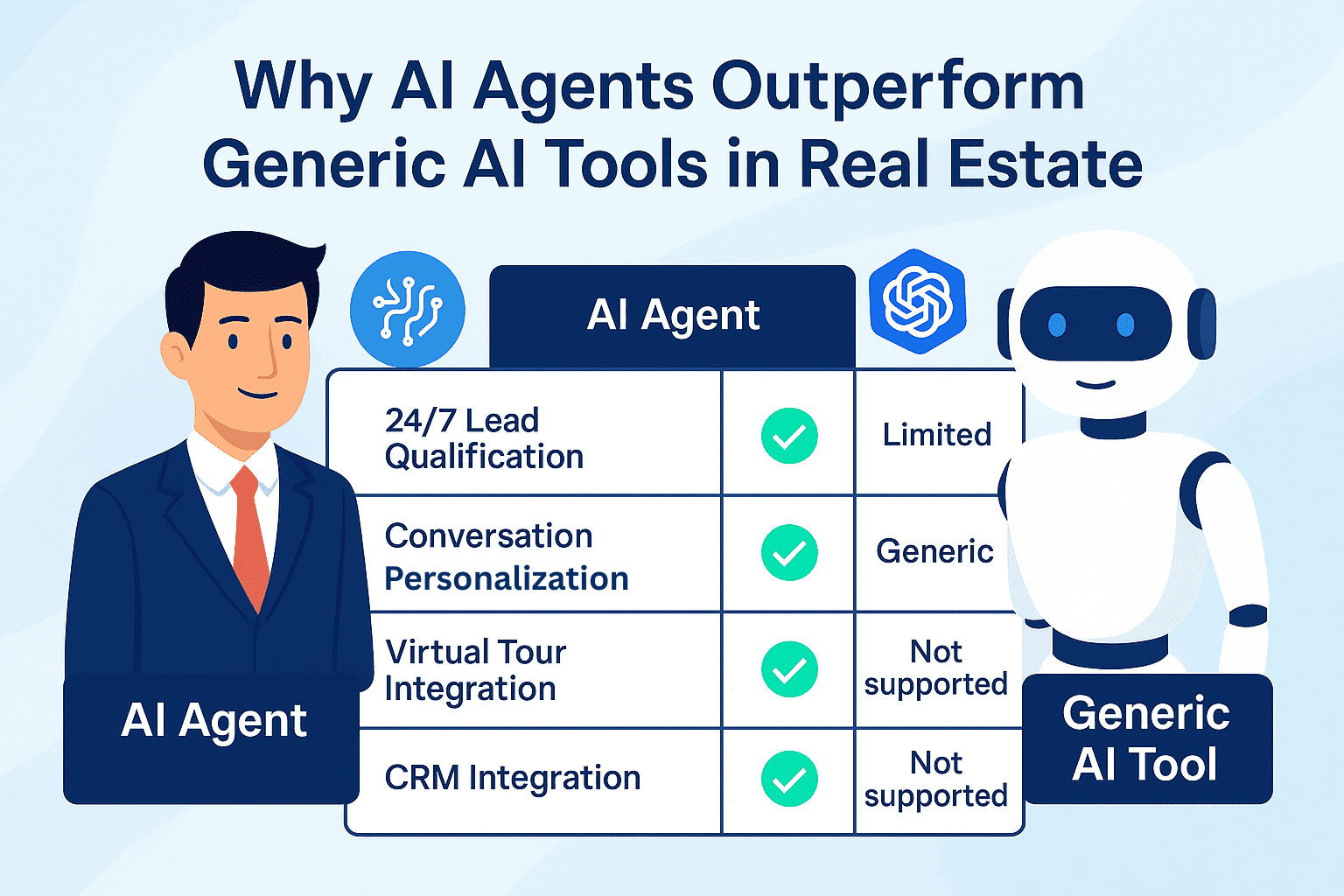
| Feature | Generic AI Chatbot | Real Estate AI Agent |
|---|---|---|
| 24/7 Lead Qualification | Limited and generic | Authentic and deep live chats |
| Conversation Personalization | Generic scripts | Hyper-personalized replies |
| Knowledge-Training and Updates | Static knowledge base | Ongoing model training with interactions, new listings, etc. |
| Virtual Tour Integration | Not supported | Smooth 3D tours in conversation |
| CRM Integration | Require manual export | Auto-sync leads data |
| Lead Routing | Not supported | Smart routing of potential leads to human agents |
| Appointment Scheduling | Basic | Calendar synced, automated reminders |
| MLS Listing Access | Not integrated | Direct integration with MLS databases for real-time property info |
| Multichannel Engagement | One platform | Operate across websites, WhatsApp, email, SMS, etc. |
| Compliance | Lacks industry-specific compliance | Built with GDPR, CCPA, and other real estate-specific compliance standards |
| Predictive Analytics | None or basic | Insightful analytics |
Simply put, AI agents for real estate provide industry-specific automation with dedicated training data and integration options to enable agents to work smarter and close deals.
How to Build the Ultimate Real Estate AI Agent [Full Guide]
Imagine this: An AI agent at a leading brokerage finishes her morning coffee, and by the time she looks at her dashboard, her AI assistant has already qualified dozens of new leads overnight. The assistant had responded to inquiries, asked smart follow-up questions, gathered relevant data, and booked showing appointments. What she now has to do is focus her energy on high-value negotiations and client meetings.
Feel impressed? Let's help you build one for your brokerage firm.
The main building block of a real estate AI agent is using a reliable and intuitive AI agent builder. Out of plenty of options, GPTBots stands out as the advanced platform to build end-to-end AI solutions for enterprises. It features:
- Intuitive, no-code AI agent builder.
- Create AI agents for customer support, appointment scheduling, lead generation/qualification, personalized recommendations, and more.
- Deliver interactive 3D walk-throughs and video tours.
- Flexible use of LLMs and custom knowledge base management.
- Pre-designed templates for fast AI agent deployment.
- Integrate AI agent on websites, WhatsApp, Slack, and other platforms.
- Advanced analytics and insights.

Simply put, GPTBots provides an all-in-one platform for real estate professionals to build and deploy AI agents for various purposes.
Let's now look at the crucial steps to build an AI real estate agent with GPTBots:
Step 1. Set Up with GPTBots
- Open the GPTBots website and create an account.
- From the main dashboard, click "New Agent" to start building your AI agent.
- Choose a real estate bot template for faster setup or select "Create from Scratch" to fully customize your agent.
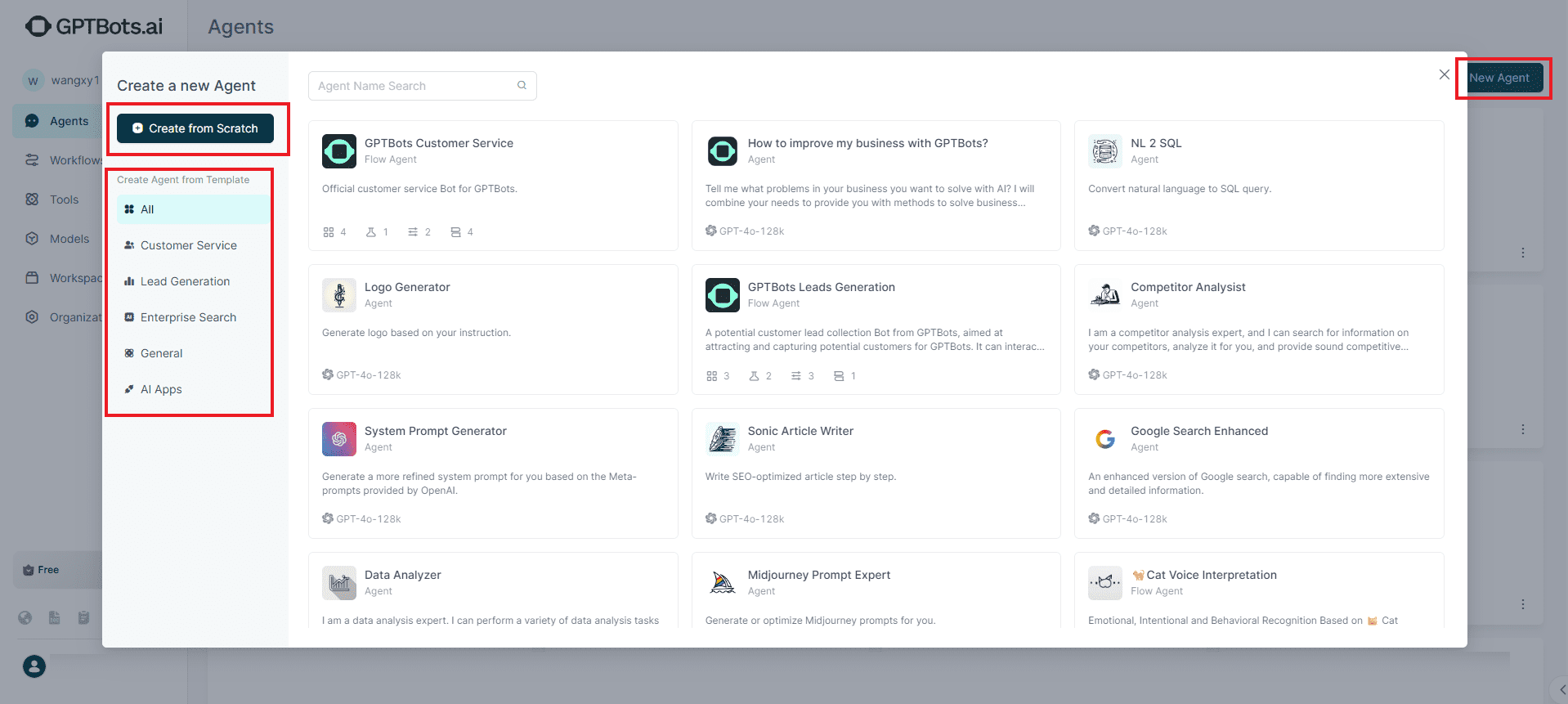
Step 2. Build the Intent Routing Engine
Now, open the visual builder to start building the conversation flow for your AI real estate agent. Configure 6 paths for branch logic design:
- Property Introduction
- Location/VR
- Sales Recommendation
- Showing Appointment
- Discount Inquiry
- Other Requests
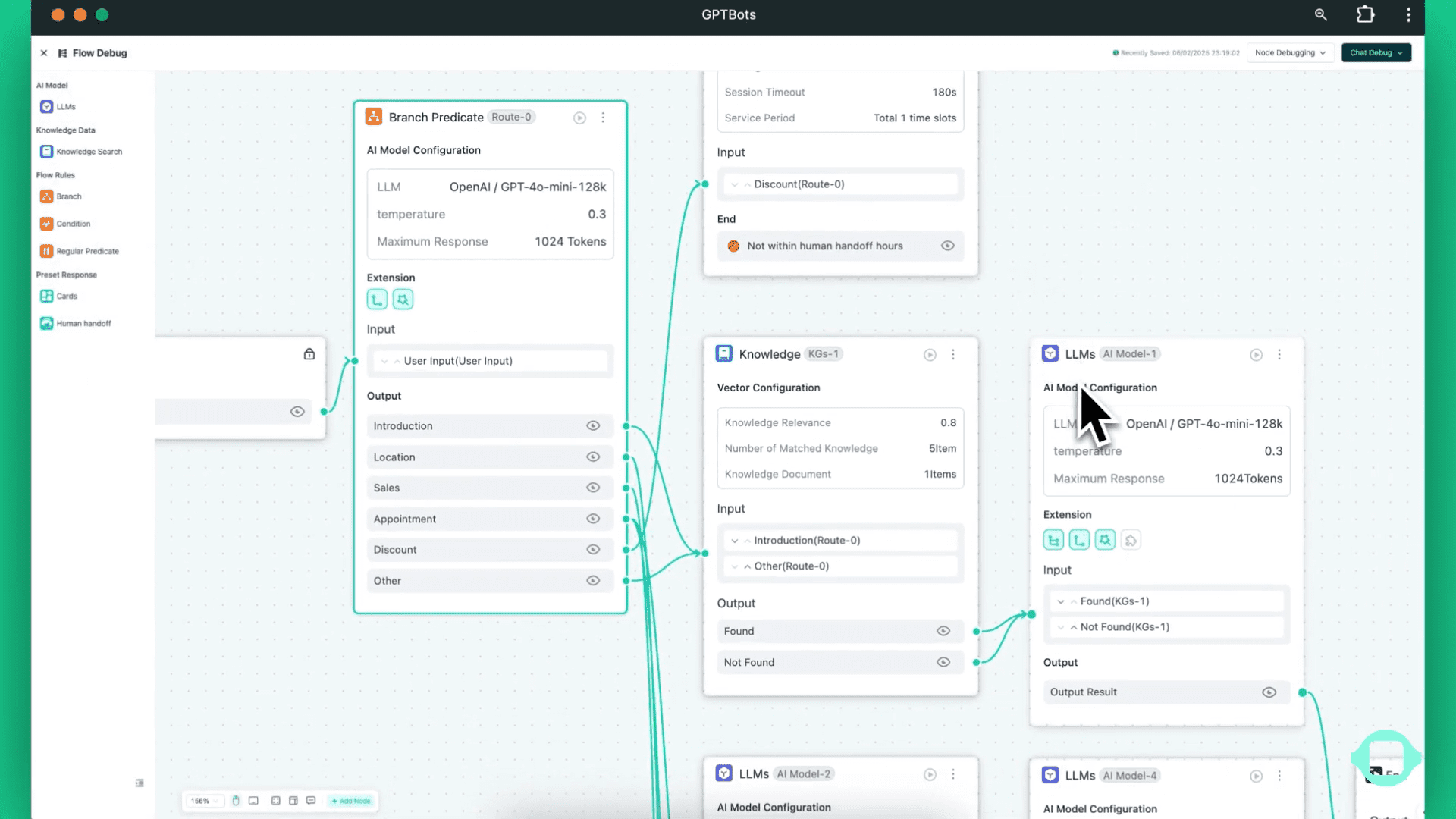
Step 3. Knowledge Base Training
Before you begin designing the functional workflow of the AI agent, upload all the knowledge base material so that the agent can receive relevant training on your corporate data.
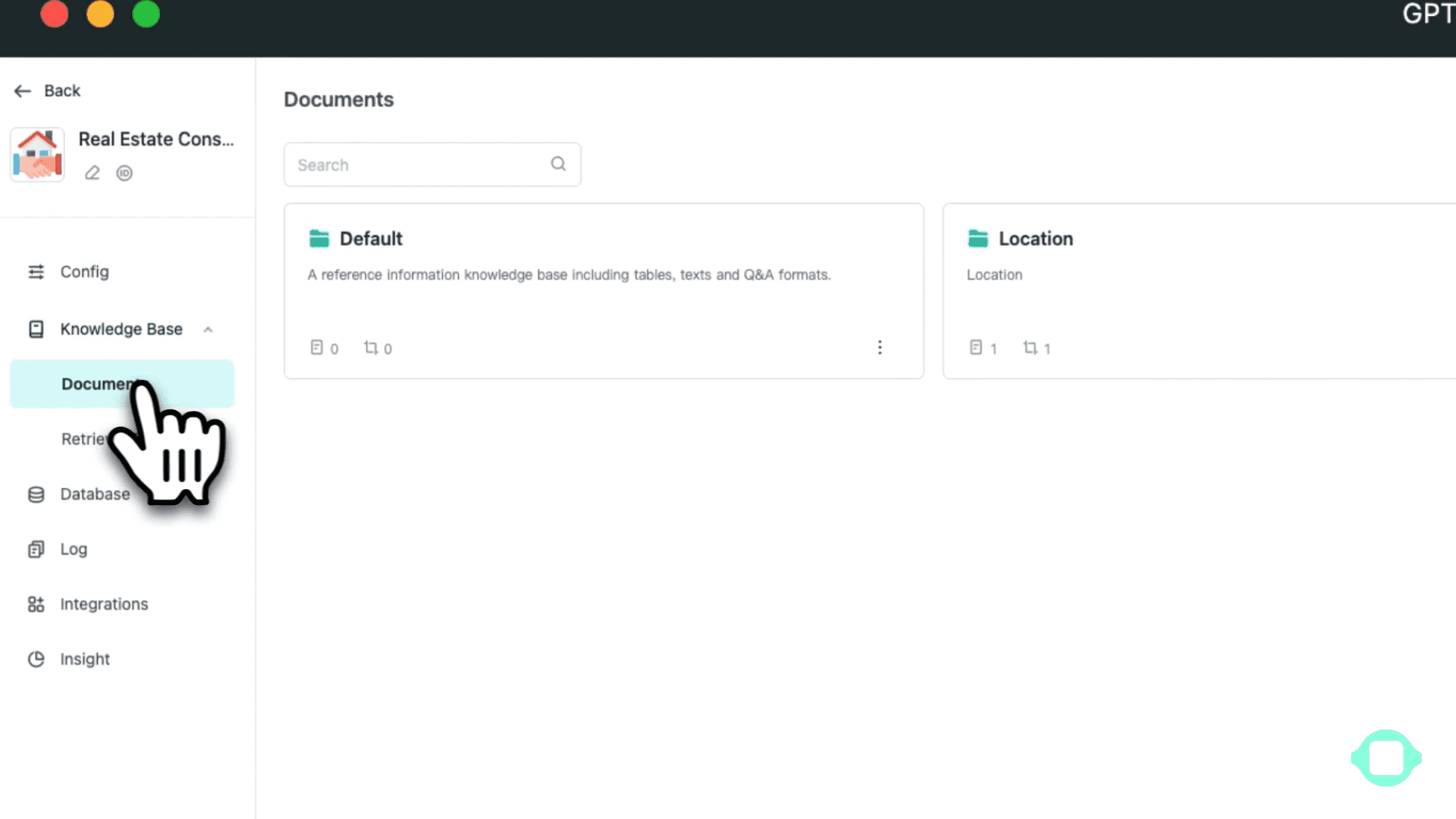
Click Knowledge Base > Documents from the left panel and upload your PDFs, spreadsheets, 3D tour links, agent bios, etc. You can create separate folders for each.
Furthermore, optimize retrieval settings as:
- Relevance Threshold: 0.78
- Number of recalls: 10
- Question Enhancement: On
- Knowledge Rearrangement: On
Step 4. Configure the LLM Module and Prompt Engineering
After the AI retrieves relevant data from your knowledge base, the information flows into the LLM module. Here you will:
- Select the Large Language Model to power your agent (such as GPT-4 or other integrated models).
- Define the LLM's role and persona (such as “luxury real estate expert with 10 years of experience”).
- Set the main objectives and skills the agent should demonstrate (such as intent recognition, property matching).
- Configure prompt templates including constraints and output examples so the agent knows how to respond accurately and consistently.
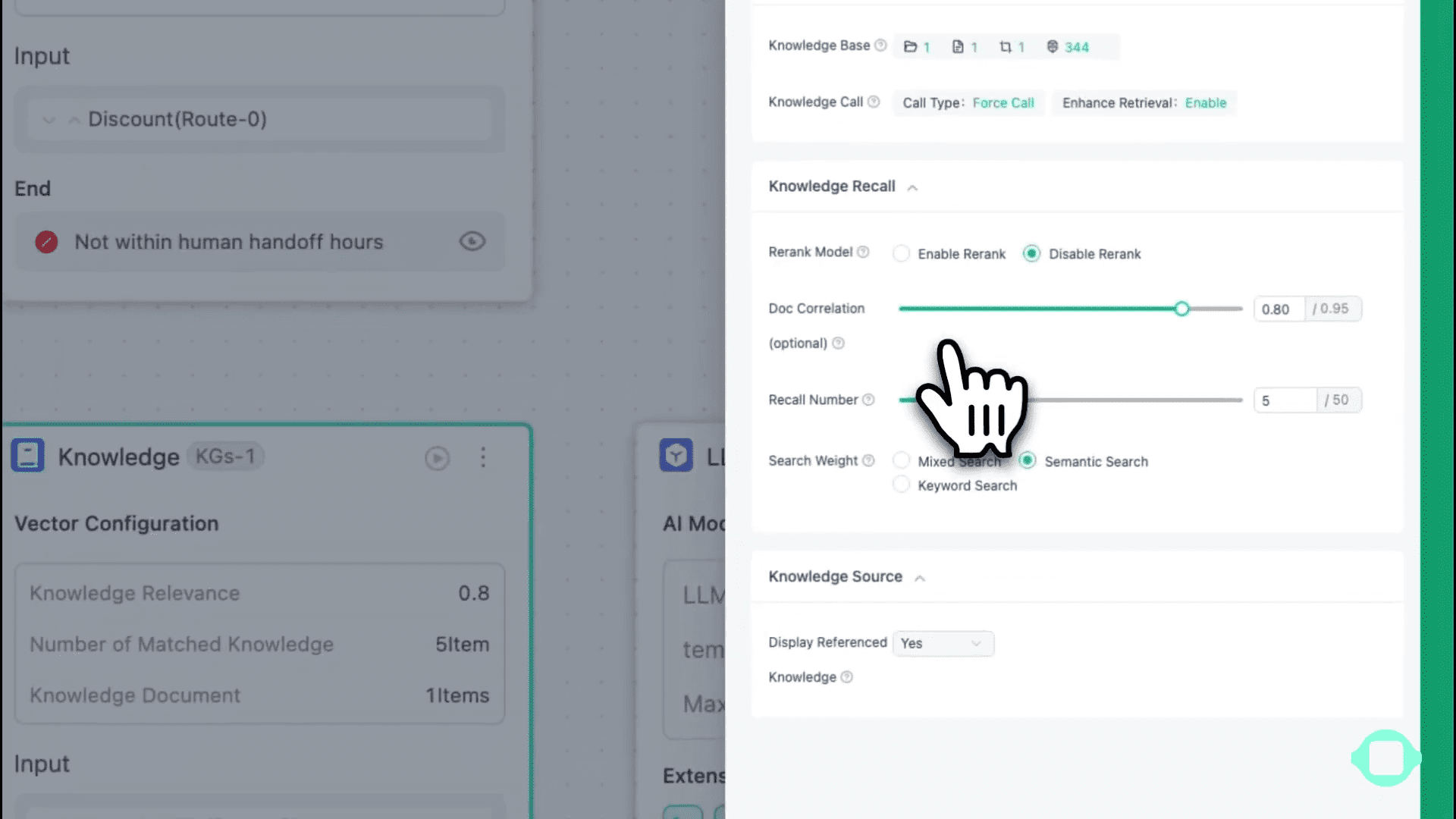
This step ensures that your AI agent generates contextually relevant and high-quality responses.
Step 5. Functional Module Development
Create dedicated modules linked to each branch:
- Property Introduction: Use 3D panoramas, floor plans, and videos.
- Location Module: Embed Google Maps links and VR neighborhood tours.
- Sales Matching Module: Upload agent profiles with photos and contact details; add WhatsApp/Calendly integration for direct booking.
- Human Service Module: Set up manual handoff via webhook to CRM for inquiries related to discounts or complex issues.
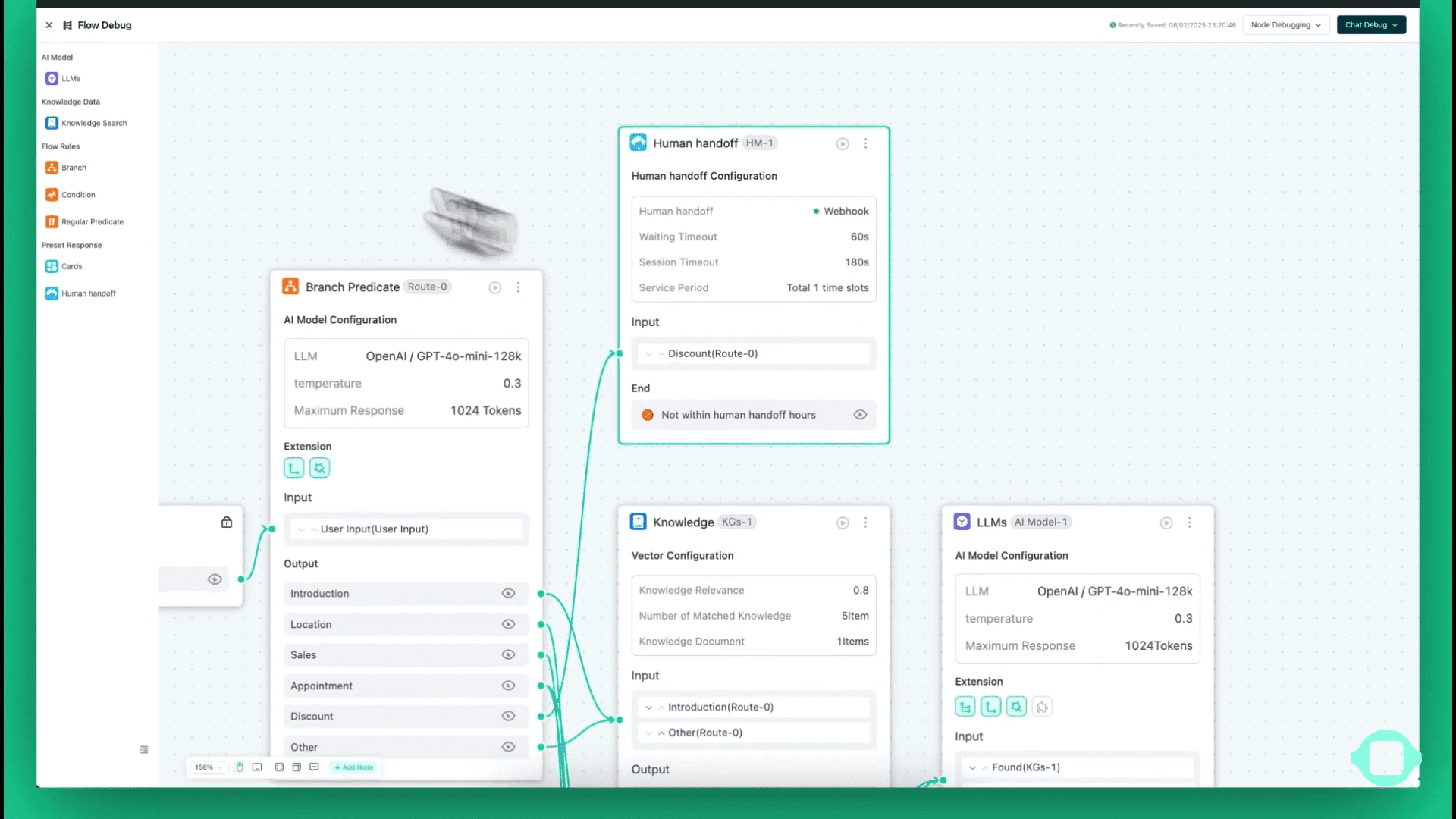
Step 6. Test Your AI Agent
Use the GPTBots testing interface to simulate conversations and fix any gaps. For example, if you ask about the location, the AI agent for real estate should pull up the location from Google Maps.
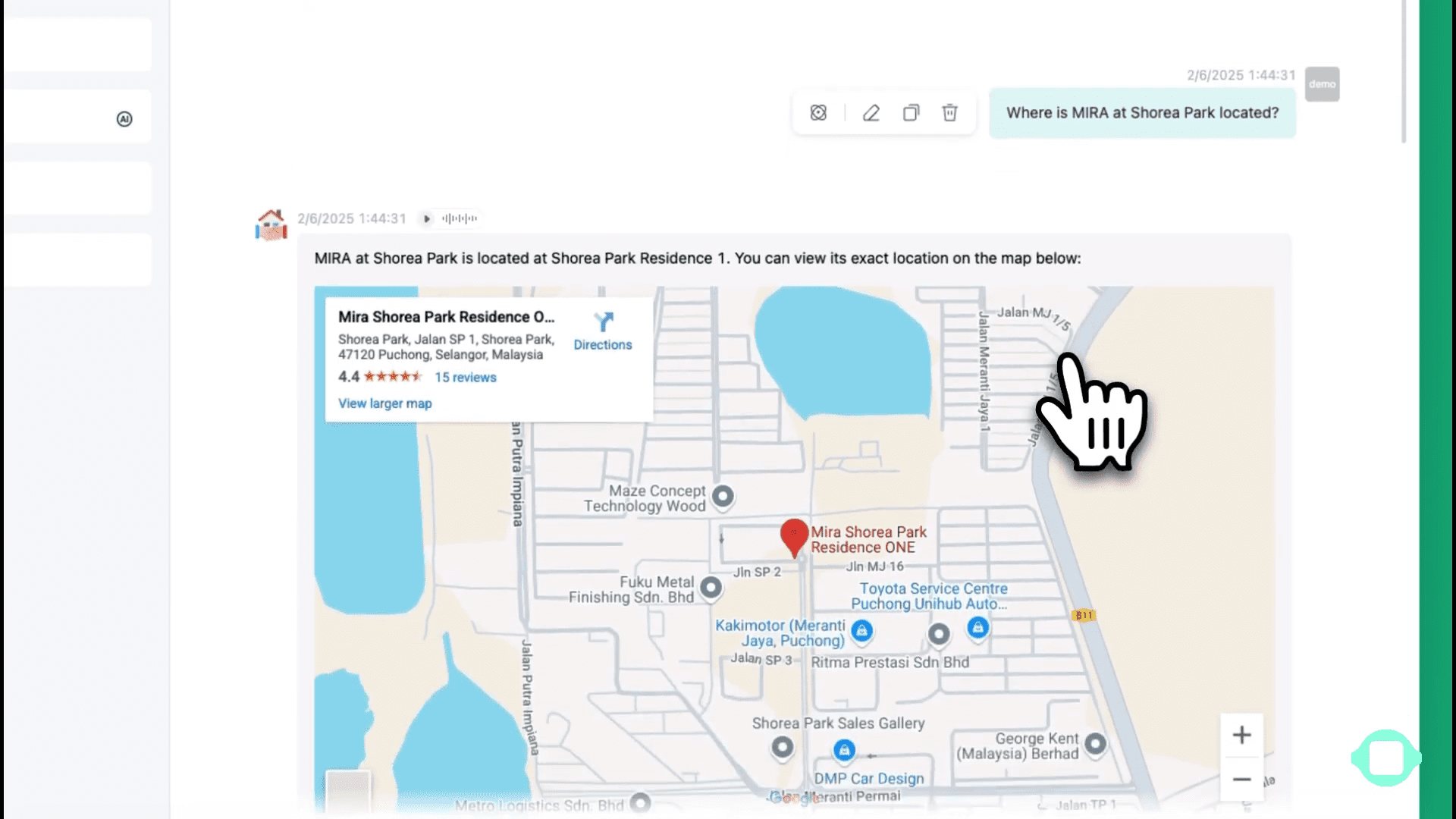
Step 7. Deploy Your AI Agent Across Channels
Publish your AI agent on your website, WhatsApp, Slack, Discord, or other platforms. Click the "Integration" tab from the left panel, choose the channel, and follow the on-screen instructions to deploy the AI agent.
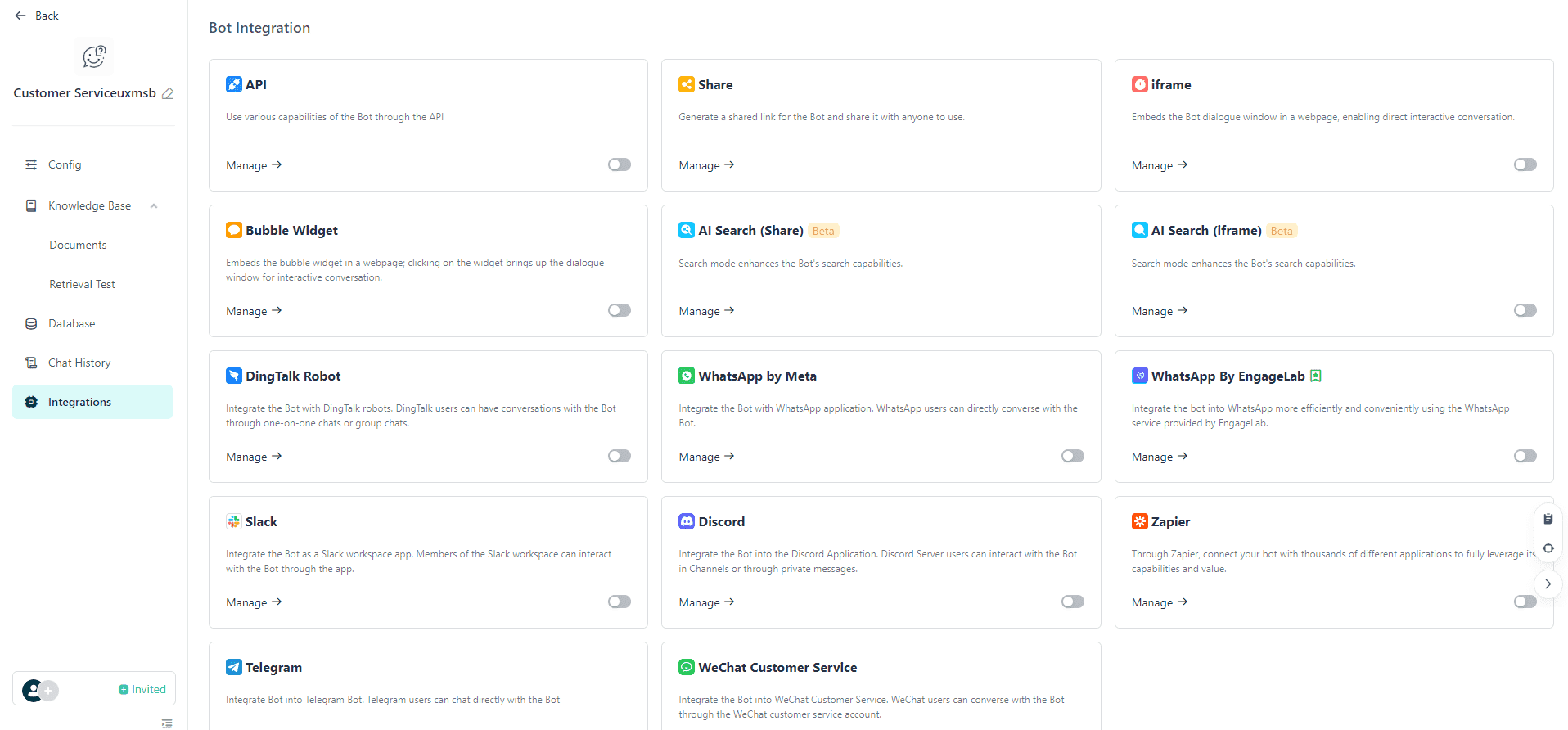
Real-World Examples and Impacts of AI Real Estate Agents
As of now, 36% of firms in the real estate sector worldwide have reported using AI, and this number is projected to go to 90% by 2030.
Implementing AI agents has proven to:
- Increase lead volume by 300%.
- Empower a single agent to serve three times more buyers with automated scheduling and virtual tours.
- Increase conversion rate by 40%.
- Enhance agent satisfaction by focusing on negotiation and relationship-building.
Let's take a quick look at a few real-world examples and impacts of AI real estate agents:
Portugal's $100M AI Real Estate Breakthrough
In early 2025, Portugal's Porta da Frente Christie's, a top brokerage, closed $100 million in sales using the fully functional AI real estate agent. This AI assistant handles lead qualification, virtual tours, and client interactions 24/7 with unmatched speed and accuracy for thousands of properties.
CEO João Cília notes that while humans can't memorize every detail, the AI retrieves all property info instantly and improves customer service. The AI boosts efficiency by automating routine tasks and letting human agents focus on closing deals and building trust.
Dunkin's 5,000 Hours Saved Annually with AI Site Selection
Dunkin used to perform manual location analysis for expansions, which used to take 1 hour per forecast. They integrated Tango Analytics' AI platform to analyze foot traffic, demographics, and competitor density. The AI cross-referenced 25+ data sources to identify optimal sites.
With AI-backed analytics, Dunkin was able to save 5,000 hours annually in market analysis and successfully opened 1,000+ new locations.
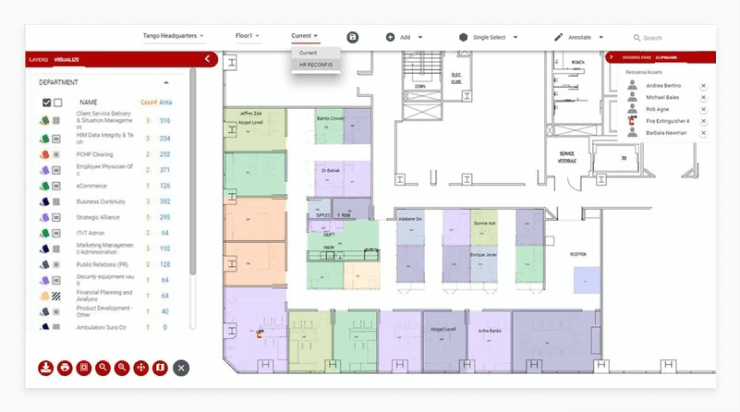
Lincoln Property Company: 41% Appointment Conversion with AI Leasing Agent
Lincoln Property Company, a major U.S. property manager, deployed "Mary", which is an AI leasing assistant from Elise AI, to automate prospect communication across email and text. The AI handled 90% of all rental inquiries 24/7, which allowed their small leasing teams to manage hundreds of monthly requests without extra hires.
As a result, Lincoln was able to increase its appointment conversion rate to 41%, compared to the industry average of 10-15%.
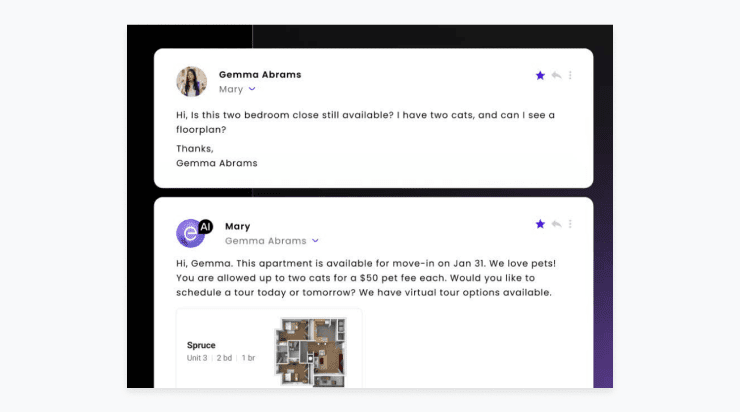
Anticipa Projects to Save €1 million Annually with AI-Generated Descriptions
Anticipa, a major real estate asset manager, sped up its property listing process by adopting Restb.ai's AI-generated descriptions. In the past, it took up to 7 days and expensive human contractors to write the listings, but now AI creates high-quality descriptions in just seconds.
With thousands of annual sales and an opportunity cost of €15 per day for each unlisted property, Anticipa expects to save over €1 million each year.
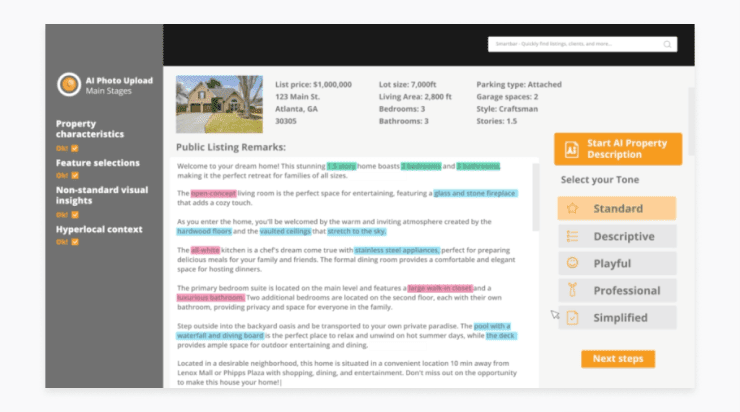
Best Practices of Using AI for Real Estate Agents
AI integration into real estate operations is a necessity, but it also requires a smarter implementation for the best outcomes.
Check out the best practices below for using an AI agent for real estate:
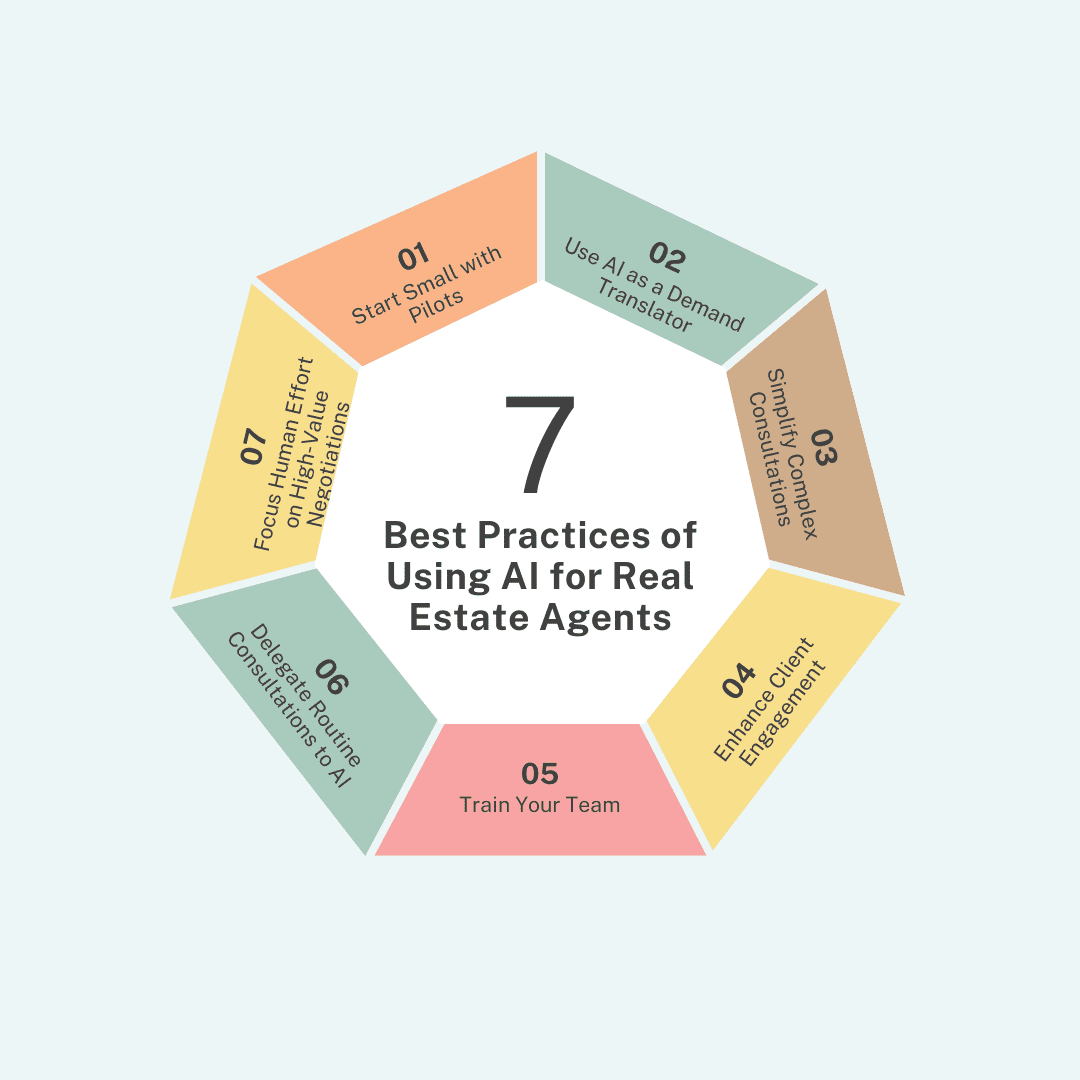
- Start Small with Pilots: Choose the best AI tools for real estate agents in 2025 and test them on a small scale before full implementation to measure their impact and mitigate risk.
- Use AI as a Demand Translator: Convert vague or general housing needs into precise and actionable parameters for better client matching.
- Simplify Complex Consultations: Break down detailed and lengthy lead consultation processes into clear and manageable steps using AI.
- Enhance Client Engagement: Utilize AI-driven virtual tours and personalized recommendations to boost satisfaction.
- Train Your Team: Educate agents to use AI tools effectively and blend outputs with local market knowledge.
- Delegate Routine Consultations to AI: Allow AI to handle repetitive or straightforward client interactions and free agents to focus on complex tasks.
- Focus Human Effort on High-Value Negotiations: Understand that AI supports but does not replace agents. It enables sales teams to spend more time on closing deals and strategic decision-making.
Beyond 2025: The Future of AI Real Estate Agents
The integration of AI for real estate agents has a long way to go. It is valued at $2.9 billion in 2024 and projected to grow to $41.5 billion by 2033, which is a massive 30.5% CAGR.
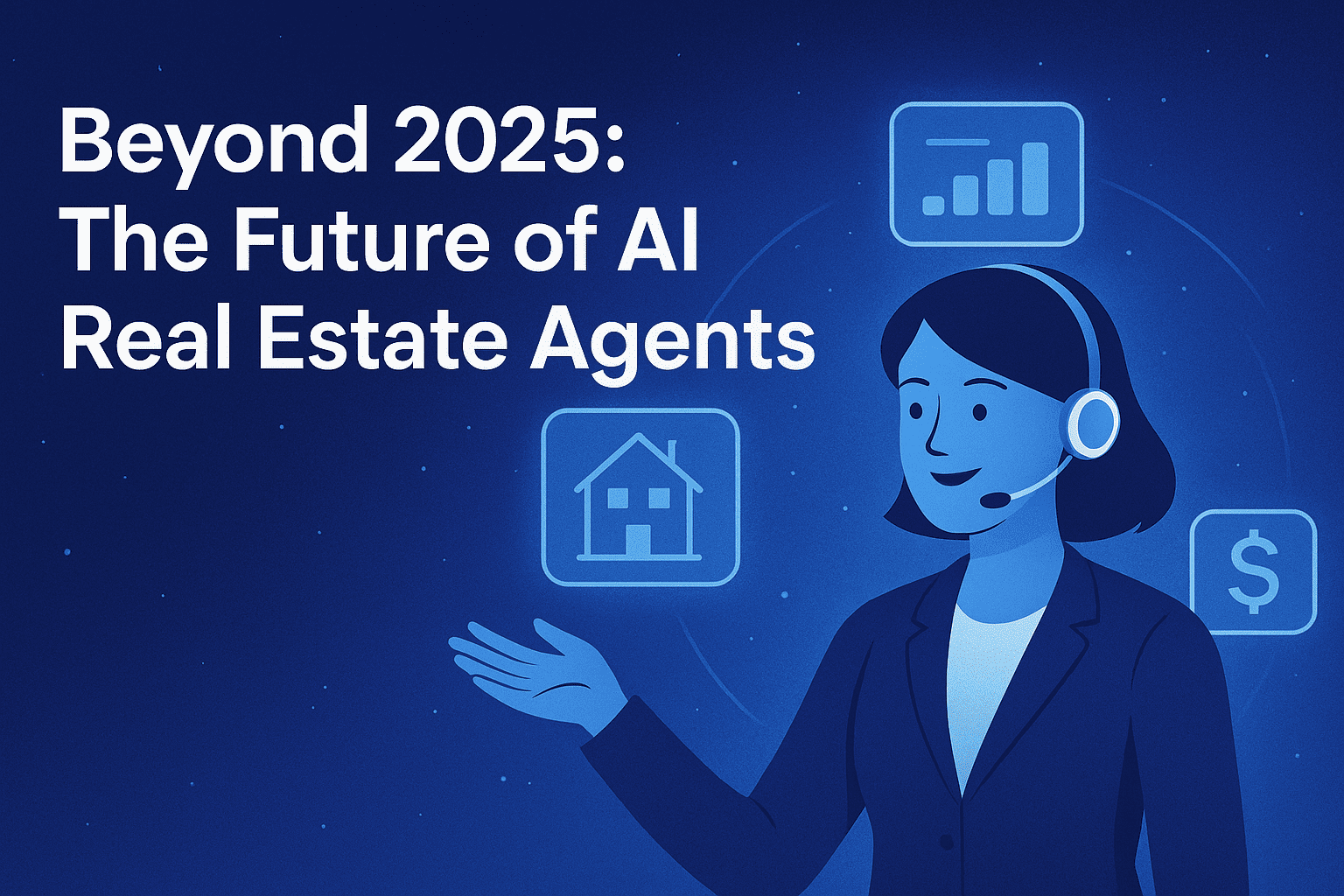
Some of the advanced future AI workflows may include:
- Cross-border property purchase tax calculation and legal compliance engines.
- AI matching system for decoration styles.
- Cash flow forecasting models for investment property leasing.
- On-demand competitor analysis and local policy impact reporting.
- Sentiment-based negotiation strategy suggestions.
The future of AI real estate agents looks more autonomous and intelligent with hyper-personalized services, deeper insights, real-time market responsiveness, and streamlined workflows.
Will AI Replace Real Estate Agents?
When talking about the future of AI real estate agents, we cannot move forward without addressing the common concern in the market, i.e., will AI replace real estate agents?
Although AI is replacing many tasks that human agents previously performed, its role is more that of a complement than a competitor. Its present and future form is meant to automate initial customer interactions, enhance agent productivity, provide valuable insights, and automate repetitive processes.
What AI cannot replace is the negotiation skills, empathy, and experience that human agents bring. Human agents are the key to building trust and handling complex emotional and financial decisions. So, despite AI having an impact in the real estate industry, it's humans who will actually close the deals.
Conclusion
Real estate firms using AI agents have already seen lead volumes surge by 300%, appointment conversions jump to over 40%, and significant cost savings. Therefore, the industry demands going beyond just knowing how can real estate agents use AI and actually deploy agents without delays.
Ready to harness the power of AI in your brokerage?
Start building your intelligent real estate AI agent today with GPTBots' no-code, all-in-one platform. Streamline your workflows, engage clients 24/7, and close more deals
Get a Custom Demo

